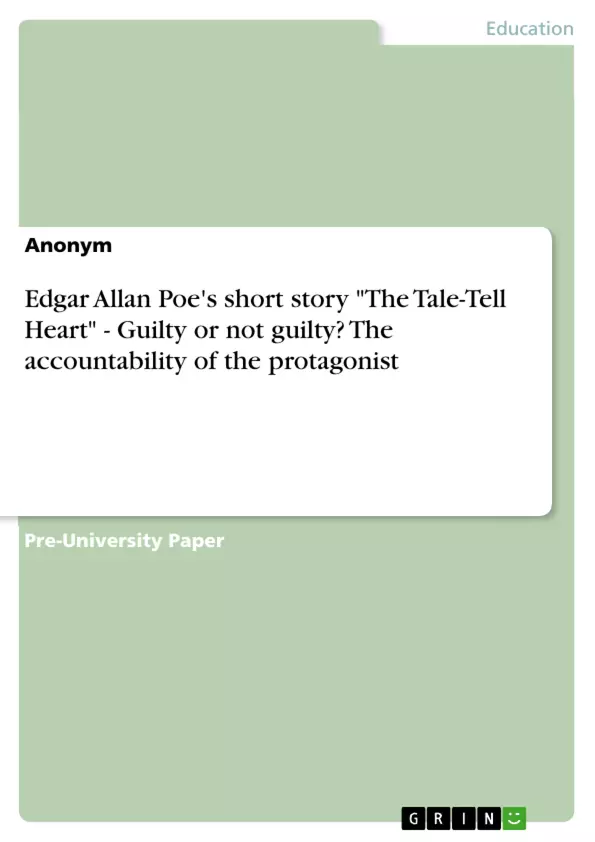Edgar Allen Poe's short story "The Tell-Tale Heart" was published in 1834. It is a story of a murder who tells us how he acted out his plan. Through this, the narrator wants to convince us that he is not insane because " Madmen know nothing. But you should have seen me. You should have seen how wisely I proceeded". He insists that his plan was without passion. He only murders the old man because of his blue eye, after which he hides his body under the floorboards. Then three policemen show up. They were alerted through the scream of the old man. The narrator allows them in. He feels safe because of how well he hid the body. While he is talking to the three-man, he starts to hear the old man's heart beating through the floor. It grows louder and louder until he confesses the murder.
The first time I stumbled upon this story was trough a reading published online by the Poe Museum. Instantly I was hooked as it was not just a reading but also a discussion about the protagonist's accountability. I have read some American literature over the years, but the horror stories always engaged me the most. The difference between someone like H.P. Lovecraft, who writes fantastical and outer worlds stories, Poe's storys always seem more human, more natural. They were about people and what scared them at the time. It was not until some odd weeks later that when I thought about what I could choose as a topic for a term paper, I thought back to myself, this discussion would be fascinating to flash out even more, so, decided it was. Firstly, I will summaries Poe's life and the historical cases on which the story is based. Then, I will analyse the story, after which I will conclude if the protagonist is accountable or not.
Table of Contents
- Introduction
- Context
- Edgar Allen Poe
- Historical Cases
- Analysis of The Tell-Tale Heart
- Conclusion
- Sources
Objectives and Key Themes
This paper aims to examine the accountability of the protagonist in Edgar Allan Poe's short story "The Tell-Tale Heart." It explores the protagonist's actions, motivations, and mental state, analyzing whether he is ultimately responsible for his crimes.
- The nature of insanity and its impact on accountability
- The role of motive and intention in determining guilt
- The relationship between the narrator and the victim
- The power of guilt and its manifestation in the protagonist's actions
- The significance of the protagonist's obsession with the old man's blue eye
Chapter Summaries
The introduction sets the scene for the analysis, introducing the protagonist's claim of sanity and the central question of his accountability. The "Context" chapter delves into the life and work of Edgar Allan Poe, exploring his influence on the development of the short story and his unique perspective on human nature.
The analysis of "The Tell-Tale Heart" examines the protagonist's meticulous planning, his claim of rationality, and the escalating intensity of his guilt, culminating in his confession. The conclusion explores the complex relationship between insanity and culpability, leaving the reader to consider the ultimate question of the protagonist's accountability.
Keywords
This paper focuses on the themes of insanity, guilt, accountability, and the power of obsession in "The Tell-Tale Heart." It explores the role of motive and intention in determining responsibility for criminal actions. Additionally, it examines the narrative techniques used by Poe to create a sense of psychological tension and unease within the reader.
Frequently Asked Questions
What is the central question of the analysis of "The Tell-Tale Heart"?
The analysis examines the legal and moral accountability of the protagonist: Is he insane or a cold-blooded murderer?
Why does the narrator kill the old man?
He claims he had no passion or motive other than his obsession with the old man's "vulture eye" – a pale blue eye with a film over it.
How does the narrator try to prove his sanity?
He points to his meticulous planning, his caution, and the "wise" way he proceeded with the murder and concealment of the body.
What leads to the narrator's confession?
His overwhelming guilt manifests as the auditory hallucination of the old man's heart beating louder and louder beneath the floorboards.
How does Poe create psychological tension?
Through the unreliable first-person narrator, the focus on sensory details (like the heartbeat), and the exploration of the dark side of the human psyche.
- Arbeit zitieren
- Anonym (Autor:in), 2021, Edgar Allan Poe's short story "The Tale-Tell Heart" - Guilty or not guilty? The accountability of the protagonist, München, GRIN Verlag, https://www.grin.com/document/1164026



